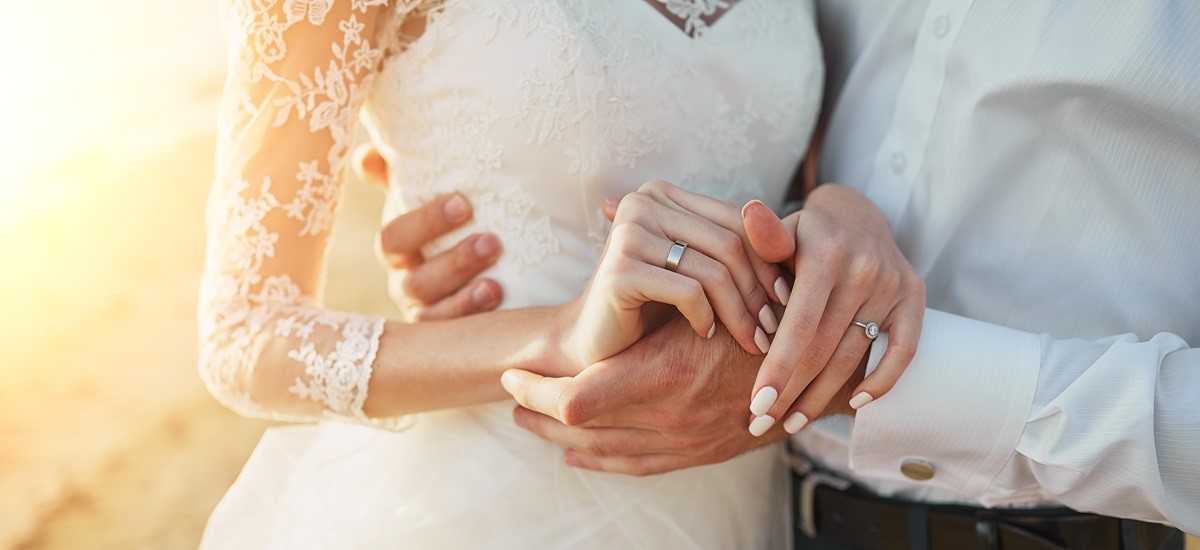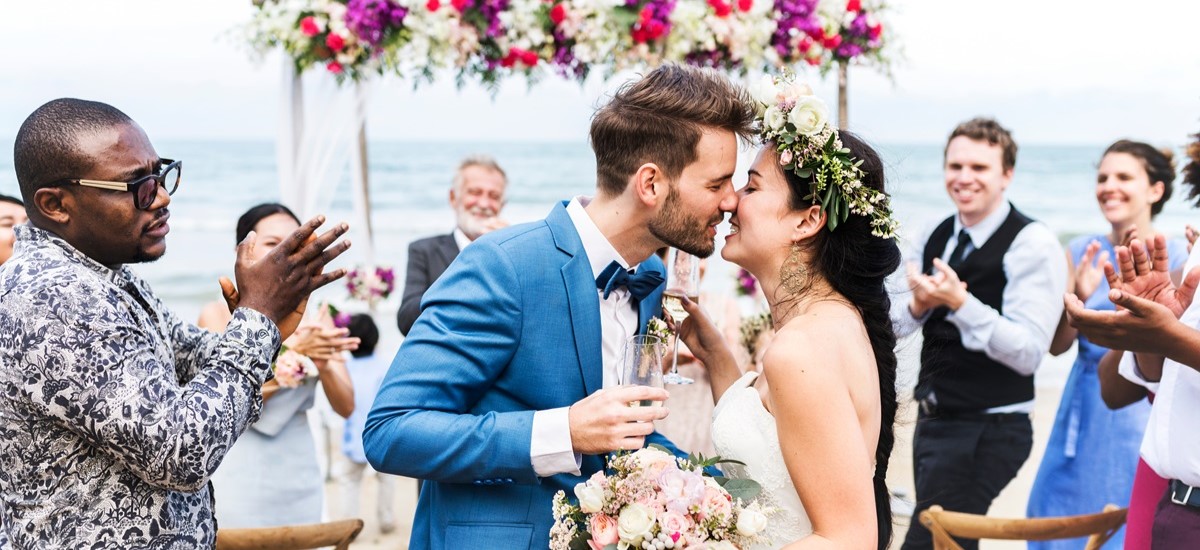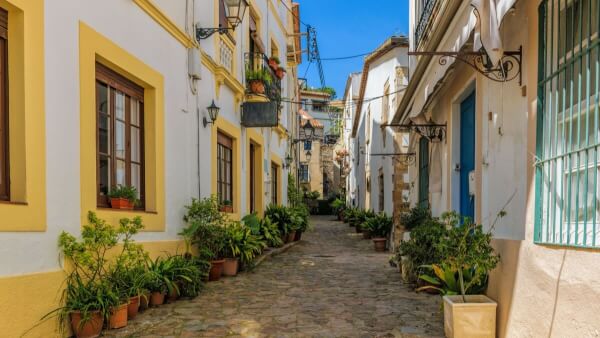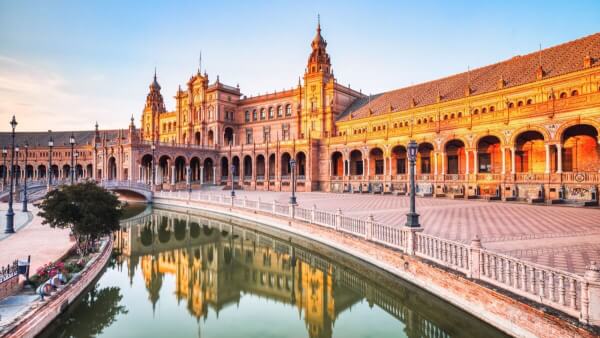Tourist licence in Spain for renting out your property
Read this helpful guide for everything you need to know about the tourist rental licence in Spain, including fees, penalties and how to apply.

If you’re looking to get married in a warm and vibrant country, Spain might be the perfect choice. With its incredible history, welcoming locals and distinctive cuisine, this can be a perfect destination for you and your partner to tie the knot.
This article addresses the basics about what you need to make getting married in Spain a reality, from the legal requirements and documentation, to estimates on costs and popular venue recommendations. We’ll also mention some Spanish wedding traditions you might want to include in your ceremony.
We will also share a handy way to manage your wedding expenses abroad using the Wise account for large amount transfers.
The linked Wise card can also be used in 150+ countries, including Spain, letting you send and spend at the mid-market exchange rate.

Although Spain is a stunning wedding destination, the legal process of getting married there can be quite complex. Some couples opt to marry in their home countries and simply host a Spanish celebration, while others are determined to navigate the local requirements and have their official ceremony there.
Civil ceremonies for non-nationals are only possible if at least one of the marrying couple has been a Spanish resident for a minimum of two years. However, Catholic church weddings don’t have this requirement.1
As a foreigner, you can have a civil wedding or get married in the Catholic church in order for your marriage to be considered legal. Symbolic ceremonies are also possible, as well as celebrating in Spain after marrying in the UK.1
The application process for civil weddings may vary depending on the specific location. However, you generally need to apply at the Civil Registry, District Court or Town Hall in the area where the wedding will take place.1
To have a Catholic wedding in Spain, at least one partner must be Catholic and neither can’t have been previously married in a Catholic church. You’ll need to gather a significant amount of documentation, so it’s best to start this process at least six months in advance.1
If you’re not a Spanish resident, you can’t legally have a religious ceremony in Spain unless it’s Catholic. Instead, many couples choose to marry in the UK and then have a blessing in their faith’s place of worship in Spain.11

Same-sex marriage or matrimonio igualitario was legalised in Spain in 2005.
However, just like with heterosexual weddings, two non-resident foreigners cannot get legally married.2
To share some local flare, you may want to include some Spanish traditions in your ceremony. Some of the most common that you might see in a traditional Spanish wedding are:
Both parties must be over 18 years old and be consenting individuals. Both civil and religious weddings are considered legal in Spain, but to qualify for a civil ceremony you must meet the two-year residency requirements.3
Non-nationals must prove that they’ve been Spanish residents for at least two consecutive years to go through a civil wedding.
If you’re planning a Catholic ceremony, you’ll also need documents such as permission from the bishop and a confirmation of completion of a pre-marital course.11
Your marriage licence application should contain the following information on both you and your spouse:
You’ll also need to make sure your passports have a minimum validity of 12 months and that you get a Spanish Town Hall Registration Certificate. Once you’ve collected everything, fill out the Extranjeria form and file it at the national police station.1
If you’re getting married in the Catholic church, these are the documents you’ll need to provide:
You must be a legal resident of Spain for at least two consecutive years to be eligible for marriage. This period should give you enough time to gather and complete all necessary documents.
You can find the British Embassy in Madrid at Paseo de la Castellana 295D, in the Torre Emperador Castellana building. While public access to the embassy is available by appointment only, you can get in touch with them through an online inquiry or by phone in case of an emergency.5
You can also access consular services in Alicante, Barcelona, Ibiza, Las Palmas de Gran Canaria, Málaga, Palma de Mallorca and Santa Cruz de Tenerife.5

Let’s go through some of the most important steps of getting married in Spain:
If you’d like to have a civil wedding in Spain, you’ll need to meet residency conditions first. On the other hand, Catholic and symbolic weddings require less time and preparation, so this should be the first thing you decide.
Since you’ll already be dealing with complicated paperwork and legal requirements, a wedding planner can be a great investment. You’ll need help for everything from booking a venue, meeting deadlines to hiring a DJ.
First, check that your passport is valid for at least a year or renew it if necessary. Regardless of the type of legal wedding you choose, you’ll need to gather many documents, have them translated into Spanish by relevant authorities and ensure they’re endorsed with an apostille.1
Two witnesses must be present at your Spanish wedding in order to sign the marriage certificate. You can’t get married without them, so pick and ask those people in advance.5
Once you’ve obtained all necessary documents, like your proof of residence and CNI, submit a marriage licence application.
Here’s a summary of what you need to do to get married in Spain:

Thanks to its fantastic weather, Spain is perfect for hosting weddings outdoors. There are plenty of venues to consider, so make sure you start planning well in advance to secure your ideal setting.
Since Spanish summers can be quite hot, the best time to have a wedding celebration is spring and early autumn. However, you might still get pleasant weather if you’re getting married in the summer or winter months.
Some of the most popular wedding destinations in Spain are the Balearic islands, the Andalusian coast, the vineyards of Rioja or Spanish cities such as Madrid or Barcelona. Let’s go through some venues you might consider getting married in.
Castell de Sant Marçal and La Baronia are some of the most beautiful venues near Barcelona. Both are surrounded by nature, but still feel luxurious and romantic.6
Mallorca is another great option, with venues such as Son Togores and the Cap Rocat. Son Togores is near Palma and Valldemossa, but still private enough to host a private garden wedding.

Cap Rocat is ideal for those who want a luxury wedding. Considered to be one of the most exclusive hotels in the Mediterranean, it’s located in a 30-hectare enclave.6
If you’d like to get married in Madrid, two stunning but very different venues are the Antigua Fábrica de Harinas and the Mandarin Oriental Ritz.
The Fábrica is located on the Jarama River banks and surrounded by fourteen hectares of lush gardens. The Mandarin Oriental Ritz is the place where King Alfonso XIII got married. The hotel can host up to 400 guests, but it’s also great for intimate celebrations.6
Other than your main expenses, you might also need to pay a church donation, which is usually around €400. A priest fee and a church admin fee are also around €400.7
Birth, death or marriage certificates will set you back £12.50 for standard service and £38.50 for fast-track.8 You’ll also pay £100 for your CNI and an additional £15 in mailing costs.9
Whether you’re planning a big celebration or a simple ceremony, getting married in Spain can fit any budget and style. Here’s a quick look at what couples usually spend on average:
| Category | Average cost10 |
|---|---|
| 🏰 Venue | €2,000 - €20,000 |
| 🍴 Catering | €70 - €150 per person |
| 📝 Wedding planner | €2,000 - €7,000 |
| 📷 Photography | €1,500 - €6,000 |
| 💐 Decorations | €1,000 - €8,000 |
| 🎶 Music | €1,000 - €5,000 |
The expenses don’t end here. You’ll also need to budget for transportation to and around Spain. Plus, if you or your partner hire a professional for makeup or hair, those costs can quickly add up.
If you want to get legally married in Spain, you’ll need to reside there for at least two years before the wedding.
Although you’ll have to do a lot of the work yourself, hiring a wedding planner will make this process much less stressful. A local expert can help you book a venue, navigate legal requirements and give much needed advice.
If you don’t speak fluent Spanish and also want all your guests to feel included in the ceremony, consider hiring an interpreter. This way, everyone can follow along and fully appreciate what’s being said.
📚 Cost of getting married abroad
A handy way to cover your wedding-related expenses is opening a Wise account. It can help you handle travel costs before the wedding, hire a wedding planner or interpreter, all while still in the UK.
A Wise account makes it easy to manage your money across borders, allowing you to send large amounts and convert money with low fees*. You can send money to 140+ countries, including Spain, and hold 40+ currencies in your account.
Getting married in Spain is vibrant and romantic, but it can also be quite expensive, especially considering the residence requirements. The venue alone might run you more than €20,000 and a wedding planner may add up to €10,000 to your expenses.
Paying for your wedding with your Wise account can help you save on currency conversion. Since most of your expenses will be in euros, using Wise gives you access to the mid-market exchange rate, helping you avoid extra fees. Meaning that dream honeymoon to Mauritius could be in your budget after all!
Large transfers are also more convenient with Wise, thanks to Wise’s dedicated support team. If you send £20,000 or more, you’ll also receive a discount and save on transfers for the rest of the month. Request a call back below or email the team before you plan your big day in Spain.
Sources used:
1. Administracion.gob.es - legal requirements
2. Perfect Wedding Company - same-sex marriage
3. Peach Perfect Weddings - legal requirements
4. Administracion.gob.es - marriage
5. Cigarral de las Mercedes - civil wedding
6. Leah Marie Photography - wedding venues
7. A White Hot Wedding - Catholic church wedding
8. Gov.uk - certificates
9. Gov.uk - CNI
10. Weddings Abroad Guide - costs
11. Weddings Abroad Guide - Catholic wedding rules
Sources last checked on date: 17-Jul-2025
*Please see terms of use and product availability for your region or visit Wise fees and pricing for the most up to date pricing and fee information.
This publication is provided for general information purposes and does not constitute legal, tax or other professional advice from Wise Payments Limited or its subsidiaries and its affiliates, and it is not intended as a substitute for obtaining advice from a financial advisor or any other professional.
We make no representations, warranties or guarantees, whether expressed or implied, that the content in the publication is accurate, complete or up to date.

Read this helpful guide for everything you need to know about the tourist rental licence in Spain, including fees, penalties and how to apply.

Planning to relocate or need to register marriage in Spain? We'll show you what you need to do to get married or register an existing marriage in Spain.

Read this to find out about the Beckham tax law in Spain, including how it works and which UK expats are eligible for it.

Plans for new 100% property tax in Spain for UK buyers announced - read this to find out everything you need to know, and what to do next.

Read our helpful guide on how to transfer a UK pension to Spain, including the steps, fees and taxes involved.

Find out everything about the highly qualified worker permit in Spain including requirements, benefits and the application process.